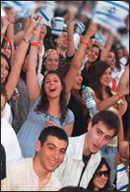The Return of Peoplehood

Among the various attempts over time to articulate a common, all-embracing sense of identity and direction for the Jews—that sprawling, fractious, and diverse group—the notion of peoplehood has been experiencing something of a revival. The Jewish Agency, for one, has announced that peoplehood will henceforth be the focus of its programming, and Israel will of course play a central role in this effort. But does a central role for Israel actually comport with the broadly inclusive tent that the "peoplehood" rubric seeks to establish? Some say no.
The term "Jewish peoplehood" in its contemporary sense originated with Mordechai Kaplan (1881-1983), the renegade American rabbi whose long career took him from Orthodoxy to Conservatism to his own creation, Reconstructionism (all without ever leaving a few neighborhoods in Manhattan). Throughout, Kaplan encouraged a vibrant Jewish culture that would work with, and off, the riches of religious tradition while dispensing with its theological claims and binding authority.
After the establishment of Israel in 1948, Kaplan concluded that "nationalism," hitherto a preferred label for a non-denominational Jewish identity, needed to be reformulated in the light of Jewish political statehood. Hence his recourse to peoplehood, defined by him as "the awareness which an individual has of being a member of a group that is known, both by its own members and by outsiders, as a people." In some ways, Kaplan's formula was meant to capture the inclusive ethos and impressive network of institutions developed by 20th-century American Jewry. In other ways, it carried forward the cultural Zionist vision of one of Kaplan's heroes, Ahad Ha-Am—a vision that, he believed, could guide Jewish ethics and creativity in both Israel and the Diaspora.
Gathering steam in the 1990s, the concept of peoplehood has increasingly appealed to Jewish professionals concerned by the steady erosion of Jewish identity and by the bitter religious and political disputes regularly wracking Jewish communities. Softening the harder edges of "nationalism," steering clear of questions of theology and belief, warmer and more intimate than Kaplan's notion of a Jewish "civilization," "peoplehood" bespeaks a commitment to agree on some things and disagree on others within a framework of fundamental solidarity.
So what is Israel's place in this? It may not have one, suggests the writer and activist Jay Michaelson, who recently declared himself "exhausted" by the need to defend Israel and asked to be counted out. Peoplehood is by definition a universal concept, but support for Israel is highly particularistic, not only substantively (in its focus on one particular place and ideology) but procedurally (in its exclusion of non-supporters). In response, Misha Galperin of the Jewish Agency has contended that peoplehood is more like an extended family, and members of a family can disagree even as they stick together.
That not all Jews are Zionists or pro-Israel goes without saying. Nor does belief in Jewish peoplehood necessarily entail support for the policies of any given Israeli government or even, one supposes, for Jewish sovereignty. Modern Jewish history has known a number of non- or anti- Zionist groups: the ultra-Orthodox Agudat Yisrael, the Socialist Bund, the territorialism championed by the great historian Simon Dubnow, to name a few. All, however, had in common a passionate commitment not only to Jewish thought, culture, and practice, however understood, but to the sheer physical well-being and flourishing of their fellow Jews. This they shared with the myriad ideological streams (and rivulets) of Zionism.
Today, too, a disciplining frame for any discussion of the meaning of peoplehood must surely be the physical and cultural survival of what is now the world's largest Jewish community, comprising millions of individual Jews living in a mind-bending thicket of geopolitical danger and moral complexity. With that commitment in place, debate can freely proceed. Without it, there is little point.
As ideas go, "peoplehood" is thin, and wide, and best kept that way: not an end in itself but a vessel for the discussion of substantive values, beliefs, and ideals. Like all vessels, this one is home to living, breathing human beings. Unless their welfare and survival are assured, there will be nobody to talk with and nothing to argue about.
Comments are closed for this article.





The slogan "We are One" really means "We were One and we are trying very hard to become One again" because both Zionism and "peoplehood" appeared on the scene precisely when the Western nation-state and nationalism threatened to overwhelm the traditional concept of Jews as a nation-in-exile and to divide us according to the nations in which we lived. One might even suggest, if one wished, a providential role in the emergence of this term.
Its greatness, it seems to me is twofold: it opens the doors to Jews and semi-Jews of all races and beliefs and it transcends the observant/secular divide.